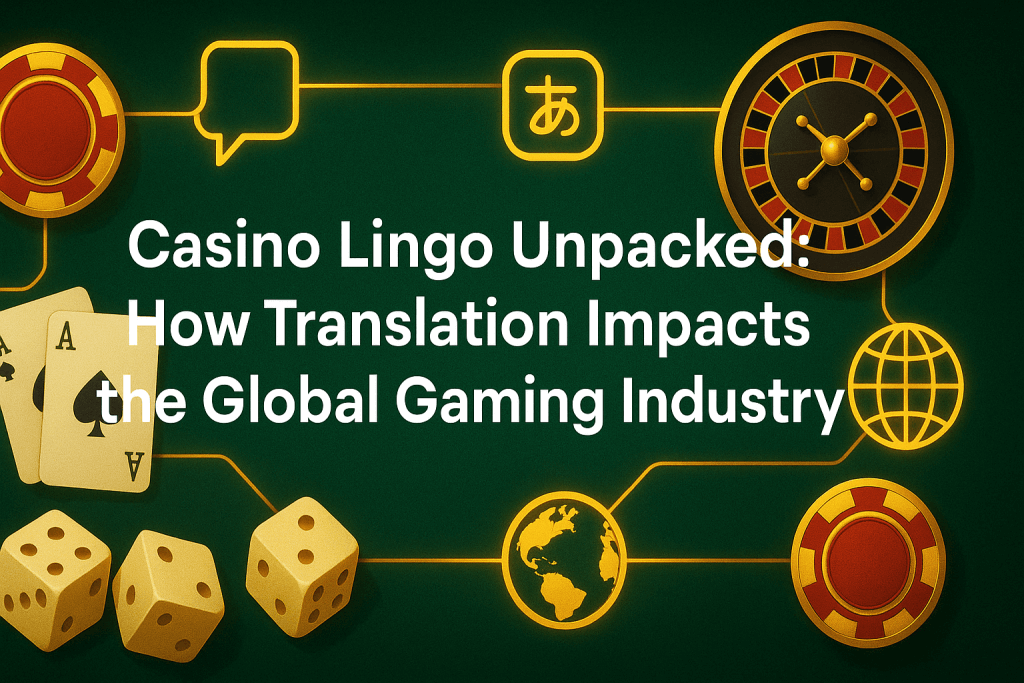Online gambling has become a global phenomenon, reaching players from Canada to Japan. This international expansion brings a key challenge: effective localization.
Casinos that want to succeed internationally can’t just plug their website into Google Translate and hope for the best. Cultural nuance, gambling slang, and legal terms require careful adaptation, not direct translation. When done poorly, mistranslations can lead to user confusion, brand mistrust, or even regulatory missteps.

The Stakes of Translation in the iGaming Space
In an industry where trust and clarity are paramount, poor translation can be costly. Imagine a new player in France interpreting a term like “rollover requirement” literally, when it actually means the number of times a player must wager bonus funds before withdrawing winnings. Or a Japanese user misunderstanding the difference between “bonus funds” (money given for promotions) and “real money” (actual cash deposited by the user).
Sloppy translations frustrate users and drive them away. In competitive markets, users quickly leave platforms that feel illegitimate or difficult to understand for options that speak their language.
For instance, platforms like minimumdepositcasinos.org demonstrate how localization ensures region-specific messaging in regulated markets, which significantly impacts the user experience.
Slang, Syntax, and the Subtleties of Casino Speak
Casino jargon itself is a minefield. Terms like:
- “High roller”
- “House edge”
- “Free spins”
- “Sticky bonus”
- “Wagering requirement”
…may sound familiar to English speakers but require thoughtful translation elsewhere. In Germany, for example, there is no direct equivalent for “sticky bonus”—a type of bonus that cannot be withdrawn, only the winnings from it can be. Translators must understand its mechanics, not just its words, to convey the correct meaning.
In some cultures, direct references to gambling might even be toned down or stylized for regulatory or reputational reasons. This is where transcreation—a hybrid of translation and creative rewriting—becomes a valuable tool.
Humor and Tone: Lost in Translation?
Some casino brands use humor and puns to build a casual, approachable tone. But translating jokes is notoriously difficult. A pun like “Bet big or go home” might fall flat or be incomprehensible in non-English-speaking markets.
Similarly, what sounds witty in English might come off as flippant or disrespectful in another culture—especially where gambling carries social stigma.
The tone needs to be carefully adjusted, not just translated. This is why localization isn’t just a job for native speakers—it’s a job for experts in both language and user behavior.
Legal Language and Responsible Gaming
Localization is also essential for compliance. Jurisdictions such as Sweden, the UK, and Ontario have strict rules governing the presentation of bonuses, age restrictions, and responsible gaming messages.
Translators must be familiar not just with the local language, but also with legal terminology and evolving regulations. A mistranslated disclaimer or missing warning message can expose casinos to fines or bans.
Why Language Builds Trust
At its core, iGaming localization is about user trust. Gamblers need to feel confident that:
- They understand how the game or promotion works.
- Their rights are clearly stated.
- They can get help or support in their language.
When these conditions are met, players are more likely to stay, deposit, and return. When they’re not, even the best platform won’t retain its users.
Translators Are the Unsung Heroes of iGaming
Translators working in the gambling space aren’t just wordsmiths—they’re brand stewards, compliance guardians, and UX strategists. Whether localizing a jackpot banner, translating bonus terms, or adjusting live chat responses to reflect cultural tone, their impact is felt across the entire player experience.
As the global market grows, so does the demand for precise, culturally aware translation. The next frontier for casino platforms is not just expanding geographically—but doing so with local nuance, clarity, and respect.
Want to see how trusted platforms communicate clearly across borders?
Visit minimumdepositcasinos.org for a look at multilingual, well-regulated online casinos tailored for different regions.

